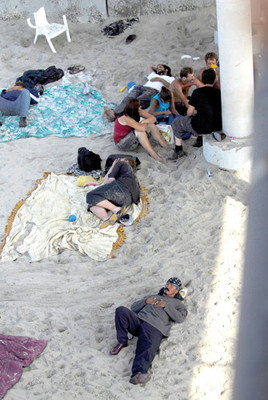
Even with City Attorney Mike Aguirre standing near a stretch of beach publicly warning college “spring breakers” that drinking on the beach is now illegal, two young women in their 20s quietly sipped a stiff one while looking out into the ocean at Mission Beach on Friday.
Ironically, they sat about a half-block from where Aguirre was speaking.
Perhaps an example of continuing beach alcohol-ban defiance and shades of things to come as the weather warms this summer, the women bothered no one as they chatted about the rocky sands of tucked-away Mexican beaches. Their plastic cups, which held modest shots of a particularly strong liqueur, sat snugly in the sand.
All that seemed to matter to Stephanie and Carmen was that it was their well-deserved day off.
It didn’t bother the women that Aguirre was condemning beach boozing, showing television crews a letter addressed to every major California University and others. The letter advises students they can be fined up to $250 if caught drinking on the beach and how repeat offenders “will get to know the City Attorney’s Office even better, as we will seek higher fines and even possible jail time.”
The letter was signed by Aguirre, who said copies of the law are posted at www.sandiegocityattorney.org. Aguirre’s warning to college students comes as a growing number of beach residents have begun observing changes in the complexion of their communities as a result of the ban, which formally took effect in January.
Denny Knox, executive director of Ocean Beach MainStreet Association (OBMA), said her office has received fewer calls about the alcohol ban overall.
At first, she said, calls to the OBMA offices were mostly against the ban, but she added that when people saw an exodus of some who regularly drank at the foot of Newport Avenue, the tone of the calls quickly changed.
“We get a lot less complaints on a daily [basis] “¦ We’ve had very few calls about things happening at the beach and our call volume of complaints has gone down,” Knox said.
Though police and lifeguards have already issued about 17 misdemeanor citations and arrested two in Ocean Beach since the start of the ban, Knox added that the real test of the ban would come when summer arrives.
Jacob Pyle, spokesperson for Freepb.org, also thinks the test would come when warmer months attract thousands to the beach.
He said a reason neighbors report less homeless and transients drinking at the beach is because it’s cold near the water this time of year. He said many community members are exaggerating the effects of the ban.
“All of a sudden they’re saying that everything is better, and [the] fact of the matter is, it hasn’t changed a bit. [The beach] looks exactly like it has every February, March for as far back as I can remember,” he said.
Pyle added that a consequence of the beach alcohol ban is that it may attract people to some community parks to drink during the major holidays. Some parks, such as Kate Sessions Memorial Park in Pacific Beach and Ocean Beach Community Park, only have partial restrictions on alcohol from 8 p.m. to 8 a.m., according to city documents.
Police and lifeguards patrolling La Jolla, Mission Bay Park and Mission and Pacific beaches have issued about 20 tickets since the ban started in January, but they seem to have missed Stephanie and Carmen.
The subversive socialite servers who work at a local sports pub in Pacific Beach had their own opinions about the beach anti-booze law Aguirre was dutifully enforcing.
“It kind of sucks that I pay my whole paycheck to an apartment right here,” Stephanie said as she pointed to an apartment-condo just behind the duo’s beach chairs, “and I can’t even go out and have a beer [on the beach].”
The women condemned those who started a Labor Day brawl in Pacific Beach last summer ” a major impetus for the enactment of the city’s ban ” where armed police had to quell a near-riot. The women said it didn’t seem fair that a few people, likely from out of town, could ruin their ability to responsibly enjoy alcohol on the beach.
But their opinion about the alcohol ban at city beaches seems to be in the minority of those who live in and around the beach communities.
Many residents, business leaders and community members around the city have begun touting the benefits of the yearlong trial ban that has allowed them to reclaim their beaches from overzealous visitors.
Andy Chotiner, a retired Mission Beach resident since 2001, said he’s noticed a cleaner beach and boardwalk.
“I bike and [Roller]blade and walk on the boardwalk,” he said. “I see more families and less cigarette butts, beer cans. There’s less litter and it’s cleaner.”
His words echo those of members from the grassroots organization Safebeaches.org. The group remains a driving force supporting the anti-alcohol ordinance. Many members joined Aguirre at the beach during his press conference.
Passed by City Council with a 5-2 vote in November, Mayor Jerry Sanders signed the ordinance on Dec. 5. The City Council will revisit the ordinance at the end of the year-long trial.








